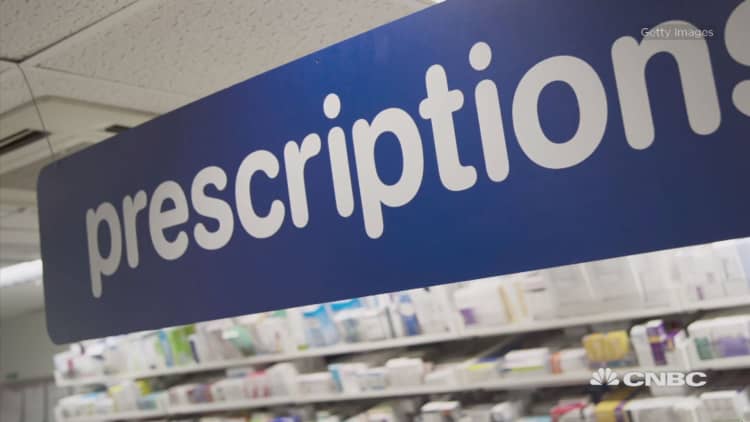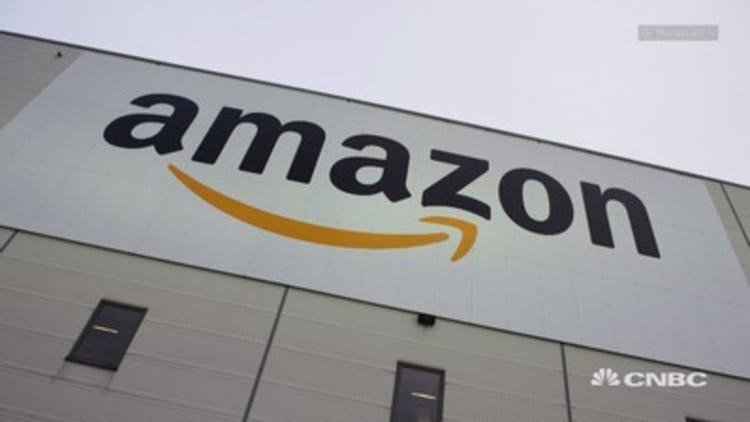
Amazon has quietly launched an exclusive line of over-the-counter health products in a possible challenge to pharmacy retail chains that could spark a price war and put pressure on store-brand profit margins.
Technically, the company doesn't own these products, which are produced by private-label manufacturer Perrigo, but it does put Amazon in a position to squeeze other retailers. The e-commerce giant launched the Basic Care line in August, including 60 products ranging from ibuprofen to hair regrowth treatment.
Pharmacies make money when people walk in looking to grab medicine and end up buying cosmetics and other goods. They're already losing traffic as people shop for those products online, including on Amazon. Giving them another possible reason to skip the store could hurt even more.
"It's a very different world, and having Amazon jump in is not a good sign for existing brands, either branded or private label, because the way Amazon works is its ability to take on unprofitable ventures for a time to see how things go," said Matthew Oster, head of consumer health research at global market research firm Euromonitor International.
"And the fact they have a near monopoly in e-commerce gives them a lot of scale that can allow them to undercut price. So that aspect should be concerning for whoever their competitors are in that space," he said.
An Amazon spokeswoman said Basic Care does not give it a pathway into selling prescription drugs. However, CNBC has reported on the company's interest in the space, including that Amazon has participated in exploratory talks with generic-drug makers. The company announced a partnership with J.P. Morgan and Berkshire Hathaway in January to create a company aimed at reducing health-care costs.
Amazon joined the medical supplies business when it inked a deal with Cardinal Health in 2014, according to a source familiar with the matter. The agreement started with Amazon administering the company store so Cardinal employees could get discounts, and then grew into selling to consumers via Amazon.com, the source said.
Cardinal did not immediately respond to CNBC's request for comment.
Skeptics say the regulatory hurdles in health care may be too high for even the mighty Amazon to overcome. But selling private-label OTC drugs — though less sexy than some alternatives — could be a much easier way to crack into health care.
Private label brands represent 31 percent, or $8.4 billion, of the U.S. OTC medication industry, according to Euromonitor. Still, branded products dominated every category except smoking cessation, according to data from Nielsen, meaning there's plenty of room for private-label drugs to grow.
Following a path of disruption
Amazon already sells branded OTC medications such as Advil, Mucinex and Nicorette, as well as options from Perrigo's generic GoodSense brand. These products are all subject to the fluctuating prices from competitors.
But its exclusive brand would not be.
Consumer health private-label brands reap larger margins than their branded peers, and stores can keep them priced relatively close to the name brand as long as they're less expensive. Amazon can apply its classic playbook of taking razor-thin profit margins in order to price products lower than competitors.
Private-label prices of 200 mg ibuprofen, 500 count
| Perrigo Basic Care | Perrigo GoodSense | Walmart | CVS | Walgreens | Rite Aid |
| $6.98 | $8.49 | $6.98 | $15.99 | $15.49 | $14.99 |
Amazon declined to disclose the margins for Basic Care products, but a spokeswoman said the company "works hard to offer low prices across its entire selection."
A 500-pill bottle of 200 mg Basic Care ibuprofen costs $6.98, in line with Walmart's price for its Equate private-label brand but almost half the average of $12.41 across Walmart, CVS Health, Walgreens and Rite Aid.
But just because Amazon offers the lowest price doesn't necessarily mean other pharmacy retailers are doomed. Consumers don't typically stock up on cold medicine and antacids ahead of time. Instead, they tend to wait until they really need them and run to a nearby store.
Sales of pharmacy products sold directly to Amazon grew by about 55 percent last year, according to One Click Retail. GoodSense, Perrigo's private-label line, was the top-selling brand. Nicorette, Align, Advil, Boiron, Mucinex, Hyland's and Zyrtec were the other most popular names.
CVS, Walgreens and Rite Aid have all added walk-in clinics to some locations as part of their efforts to give people reasons to continue walking into stores. And it could take time to change people's buying habits.
Top OTC medicine brands sold to Amazon
| Brand | Categories | 2017 Rank |
| GoodSense | Variety brand. Primarily allergy medicines/stomach remedies | 1 |
| Nicorette | Smoking cessation | 2 |
| Align | Probiotic supplements/stomach remedies | 3 |
| Advil | Analgesics/pain relief | 4 |
| Boiron | Homeopathic/all-natural remedies | 5 |
| Mucinex | Cough/cold | 6 |
| Hyland's | Homeopathic/all-natural remedies | 7 |
| Zyrtec | Allergy/sinus | 8 |
Source: Source: One Click Retail
Basic Care could have better luck with items that people stockpile, such as nicotine gums and allergy medicines, said Danny Silverman, chief marketing officer at Clavis Insight, an e-commerce analytics insight provider.
Preparing for Amazon
Health-care executives are often asked about what Amazon's threat means for their business and how they're preparing. The e-commerce giant has already wreaked havoc on multiple industries, and pharmacy retailers are bracing themselves.
The three largest chains — CVS, Walgreens Boots Alliance and Rite Aid — are now all pursuing M&A deals possibly in part to protect themselves from Amazon.
A CVS spokeswoman declined to comment.
A Walgreens spokesman said the company doesn't have any comment on competitor moves in private label, but emphasized it already has a portfolio of highly regarded brands.

CVS announced in December it planned to acquire Aetna for $69 billion to create an integrated health system that combines pharmacy and health benefits with retail clinics. The Wall Street Journal reported last week that Walgreens Boots Alliance had approached AmerisourceBergen about acquiring the portion of the major drug distributor it doesn't already own.
And on Tuesday, grocery chain Albertsons said it plans to acquire the remainder of Rite Aid that isn't being sold to Walgreens. Amazon is probably a material factor in the deal, said Evercore ISI analyst Ross Muken.
A Rite Aid spokeswoman told CNBC the company is doing this deal because it makes strategic and financial sense for both companies, and it's about accelerating both companies' existing growth strategies.
"The front end [of the store] is clearly under quite a lot of pressure," Muken said. "There's no doubt about it."
— CNBC's Christina Farr contributed to this report.
Correction: This story has been updated to reflect that private label brands represent 31 percent, or $8.4 billion, of the U.S. OTC medication industry, according to Euromonitor.
WATCH: Bezos building a giant clock inside Texas mountain



